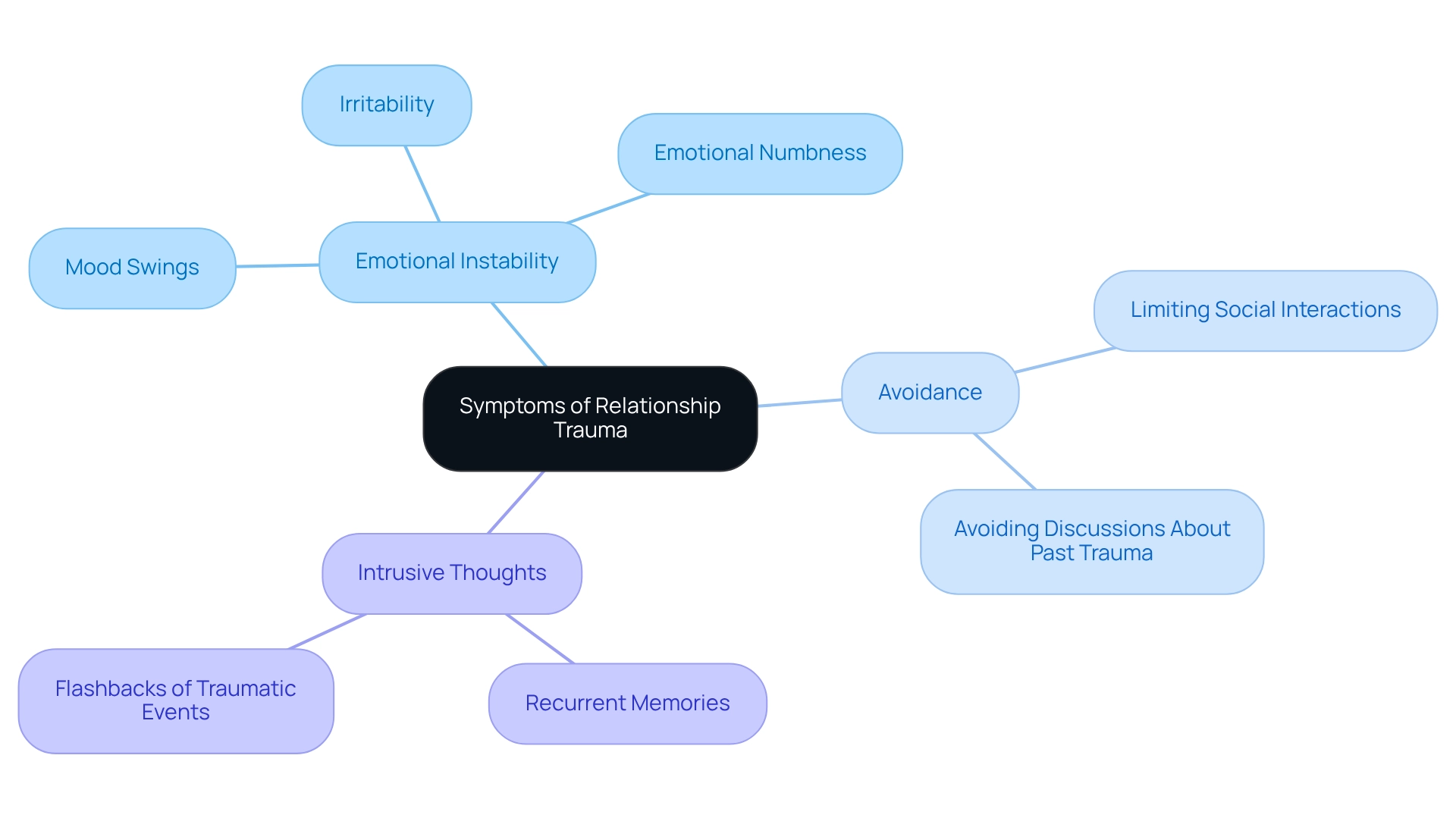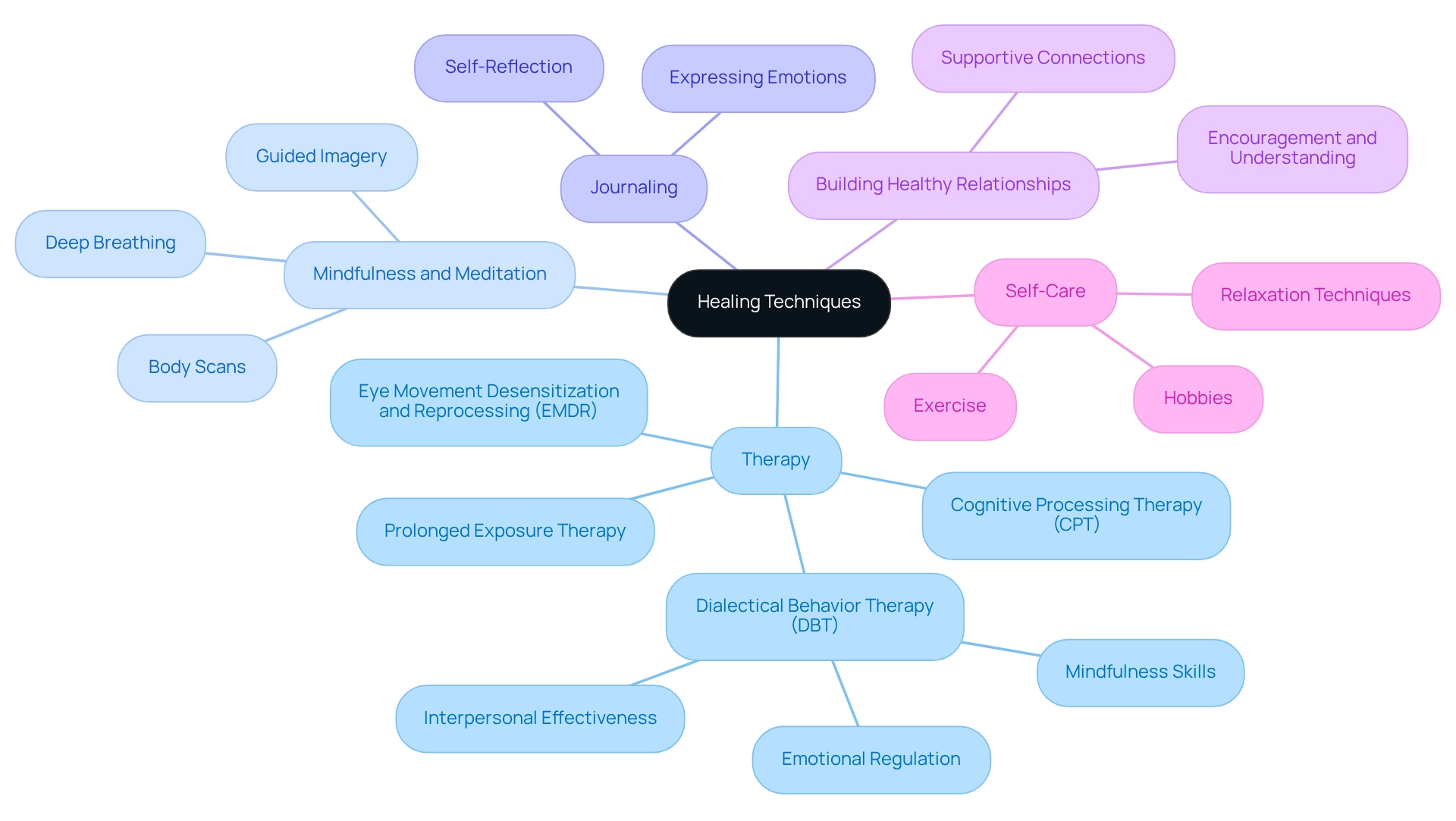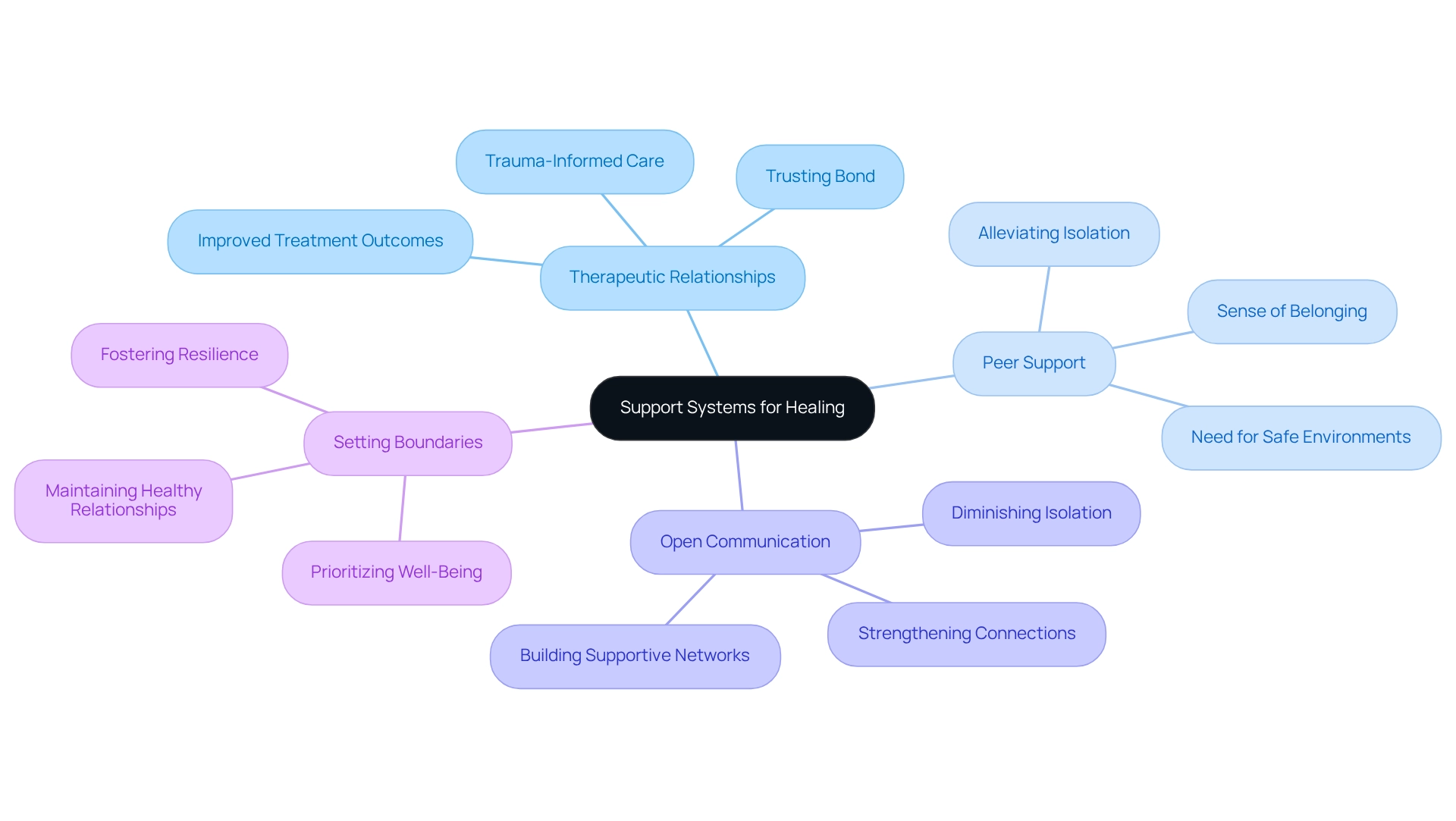Overview
Understanding relationship trauma means recognizing its symptoms and embracing effective healing techniques that foster recovery. Have you ever felt overwhelmed by your past? Emotional distress from previous relationships can lead to feelings of emotional instability and avoidance. It’s crucial to acknowledge these feelings and the impact they have on your life.
In this journey of healing, therapy, mindfulness, and support systems play vital roles. These elements not only help in managing symptoms but also create a nurturing environment for growth and recovery. As we explore this further, consider how these approaches can guide you toward overcoming the impacts of such trauma.
By taking the first step towards seeking help, you can begin to heal and reclaim your emotional well-being. Remember, you are not alone in this journey, and support is available to help you navigate through the challenges.
Introduction
In the intricate tapestry of human relationships, the scars of trauma can weave a complex narrative that profoundly impacts emotional well-being. Have you ever felt overwhelmed by your past? Relationship trauma, stemming from experiences of abuse, neglect, or betrayal, often traces its roots back to childhood, shaping how individuals navigate intimacy in adulthood. Recognizing the signs and symptoms of this trauma is the first step toward healing, as it allows individuals to confront their emotional landscape and seek the support they need.
As we explore this further, it's important to understand that with a focus on therapeutic interventions and community connections, the journey to recovery becomes not just a personal endeavor, but a shared experience that fosters resilience and empowerment. Through understanding and practical healing techniques, individuals can reclaim their emotional health and build healthier, more fulfilling relationships. Together, we can embark on this journey towards healing and connection.
Define Relationship Trauma: Understanding Its Roots and Impact
Damage to one's psyche encompasses the psychological and personal harm stemming from relationship trauma in close relationships. This distress can arise from various forms of abuse—emotional, physical, or sexual—as well as neglect and betrayal. Often, the roots of relational distress and relationship trauma are deeply embedded in childhood experiences, where patterns of behavior and emotional reactions take shape. For instance, ongoing childhood distress may lead to a heightened state of awareness, affecting how individuals perceive and engage in adult relationships.
At The Emerald Couch, we are dedicated to providing high-quality care for trauma and anxiety disorders in adults. We understand that the impact of such trauma is profound, often resulting in long-lasting mental health challenges, including anxiety and depression. are designed to meet the unique needs of each client, ensuring that those struggling to establish healthy connections receive the support they deserve. Recognizing these origins is vital for understanding one’s emotional landscape and managing current relationships.
As Bianca Sparacino beautifully expresses, "Own who you are and what you want for yourself. Stop downplaying the things you care about, the hopes you have." This sentiment highlights the significance of personal empowerment in the healing journey. Moreover, Brené Brown reminds us that we heal through connection, emphasizing the communal aspect of recovery. At The Emerald Couch, we believe that healing from emotional wounds is not merely an individual journey; it can also foster collective healing. When individuals process their struggles, they can help others break the cycles of suffering, creating a ripple effect of healing.
Recent studies underscore the prevalence of emotional distress, illuminating its psychological effects and the necessity for targeted therapeutic approaches. Understanding the roots of emotional distress is crucial for nurturing resilience and addressing relationship trauma to foster healthier relationships in the future. Through our evidence-based methods and commitment to cultivating secure therapeutic connections, The Emerald Couch empowers clients on their path to wellness.
Identify Symptoms of Relationship Trauma: Recognizing the Signs
Signs of relationship trauma can manifest in various ways, significantly impacting mental well-being. Have you ever felt overwhelmed by your past? Recognizing these key indicators can be the first step toward healing:
- Emotional Instability: You may find yourself experiencing frequent mood swings, irritability, or even emotional numbness. This can make it challenging to maintain stable relationships. Difficulty in trusting partners or friends often arises from relationship trauma, leading to a pervasive sense of doubt and insecurity in your connections. Hypervigilance, which is a constant state of being on guard where you anticipate potential threats or harm, can hinder your ability to engage fully in relationships, particularly in the context of relationship trauma.
- Avoidance: You might avoid situations or discussions that could evoke memories of prior distress associated with relationship trauma, which limits your social interactions and connections. Intrusive thoughts, such as recurrent memories or flashbacks of traumatic events, can disrupt your daily life and are often a symptom of relationship trauma, making it difficult to focus on the present.
Recognizing these symptoms is crucial for navigating your emotional landscape effectively. At The Emerald Couch, your treatment will begin with an intake session where we gather the necessary information to collaboratively develop your custom treatment plan. This includes defining what success looks and feels like for you.
Studies indicate that 62% of people receiving medication for , underscoring the importance of seeking appropriate support. In addition to this, understanding the four stages of (CPT)—education about PTSD and CPT, processing the distress through a written narrative, learning to challenge thoughts regarding the distress, and addressing specific areas of life typically affected by distress—can offer a structured approach to healing. By recognizing these indicators of relationship trauma, you can take proactive measures toward recovery and restoring confidence in your connections.

Explore Healing Techniques: Practical Approaches to Recovery
Recovering from relationship trauma requires a multifaceted approach that embraces various practical techniques. Here are some effective strategies to consider:
- Therapy: Have you ever felt overwhelmed by your past? Engaging in individual or group therapy at The Emerald Couch offers a safe environment to process relationship trauma. Our trauma experts employ methods such as Cognitive Processing Therapy (CPT), Eye Movement Desensitization and Reprocessing (EMDR), and Prolonged Exposure therapy. These approaches have proven especially effective in helping individuals manage their psychological challenges and promote recovery. Additionally, (DBT) equips clients with skills in mindfulness, emotional regulation, and interpersonal effectiveness, further enhancing their coping mechanisms. We prioritize building a trusting relationship before addressing any triggering events, ensuring your comfort throughout the therapeutic process. Your journey will begin with an intake session, where we gather the necessary information to collaboratively develop your custom treatment plan.
- Mindfulness and Meditation: Practicing mindfulness is a cornerstone of our therapeutic approach, helping individuals remain grounded and alleviate anxiety. Techniques such as deep breathing, body scans, and guided imagery can significantly improve mood regulation and overall well-being. Research indicates that mindfulness practices can lead to a reduction in symptoms of anxiety and depression, making them invaluable tools in the recovery from relationship trauma. At The Emerald Couch, we emphasize the importance of mindfulness as a key component of healing and personal growth.
- Journaling: Recording feelings and experiences acts as a powerful means for expressing emotions and self-reflection. Have you tried journaling? It enables individuals to articulate their thoughts and gain insights into their healing journey.
- Building Healthy Relationships: Surrounding yourself with supportive people fosters a sense of safety and belonging, which is crucial for recovery. Positive social connections provide encouragement and understanding during the healing process.
- Self-Care: Participating in activities that enhance physical and mental well-being—such as exercise, hobbies, and relaxation techniques—is vital for recovery. Prioritizing self-care assists individuals in regaining a sense of control and boosts their resilience.
Integrating these methods into your daily life can greatly assist in healing from relationship trauma, enabling you to regain your mental wellness and promote personal development. As emphasized in the case study 'The Journey of Healing from Betrayal Trauma,' recovery is a personal and ongoing process that entails acknowledging the distressing experience, accepting its reality, and expressing emotions. With time and effort, individuals can reclaim a sense of well-being and inner peace, overcoming the emotional scars of betrayal. LET'S TALK THROUGH IT—GET STARTED TODAY.

Utilize Support Systems: The Role of Therapy and Relationships in Healing
Support systems are vital for healing from relationship trauma, including several key components that nurture emotional well-being and recovery.
Therapeutic Relationships: Establishing a trusting bond with a therapist is crucial for recovery. Have you ever felt overwhelmed by your past? Therapists trained in trauma-informed care provide essential guidance to help clients who are experiencing relationship trauma navigate complex emotions and develop effective coping strategies. Studies suggest that a robust therapeutic alliance greatly improves treatment results, underscoring the significance of these connections in recovery from relationship trauma.
Peer Support: Engaging with support groups or communities of individuals who share similar experiences fosters a sense of belonging and understanding. These groups can alleviate feelings of isolation, offering a platform for sharing and healing. However, prior negative experiences and relationship trauma, along with concerns about stigma, can discourage some survivors from participating in peer support. This highlights the need for inclusive and safe environments where everyone feels welcome, particularly for individuals dealing with relationship trauma.
Open Communication: Encouraging open dialogue with friends and family about one’s experiences can diminish feelings of isolation and promote healing. This communication is essential for building that reinforces recovery efforts. As we explore this further, consider how sharing your journey might strengthen your connections.
Setting boundaries is vital for maintaining healthy relationships and protecting oneself from further relationship trauma. This skill enables people to navigate their interactions more effectively, fostering resilience. In addition to this, setting boundaries empowers individuals to prioritize their well-being.
Utilizing these support systems creates a nurturing environment conducive to healing, allowing individuals to reclaim their emotional well-being and move forward in their lives. Remember, reaching out for help is a courageous step towards healing.

Conclusion
The journey of healing from relationship trauma is multifaceted, involving a deep understanding of its roots, recognizing its symptoms, and employing effective strategies for recovery. Relationship trauma, often stemming from adverse experiences in intimate connections, can significantly impact emotional well-being, leading to challenges such as:
- Emotional instability
- Trust issues
- Hypervigilance
Have you ever felt overwhelmed by your past? By identifying these symptoms, individuals can take proactive steps toward healing, ultimately reclaiming their emotional health.
Practical approaches to recovery, including:
- Therapy
- Mindfulness
- Journaling
- Building healthy relationships
play a crucial role in this process. Engaging with therapeutic professionals and supportive communities fosters resilience and empowerment, allowing individuals to navigate their emotional landscapes more effectively. The importance of self-care and establishing personal boundaries cannot be overstated, as these practices enhance emotional regulation and contribute to overall well-being.
In conclusion, healing from relationship trauma is not merely an individual endeavor; it is a collective journey that thrives on connection and support. By recognizing the signs of trauma and utilizing available resources, individuals can embark on a path toward recovery that not only transforms their own lives but also creates a ripple effect of healing within their communities. Embracing this journey with courage and compassion is essential for fostering healthier, more fulfilling relationships in the future.
Frequently Asked Questions
What is relationship trauma?
Relationship trauma refers to the psychological and personal harm that arises from distress in close relationships, often stemming from various forms of abuse—emotional, physical, or sexual—as well as neglect and betrayal.
How does childhood experience relate to relationship trauma?
The roots of relationship trauma are often deeply embedded in childhood experiences, where patterns of behavior and emotional reactions develop. Ongoing distress in childhood can lead to heightened awareness that affects adult relationships.
What are the mental health challenges associated with relationship trauma?
Relationship trauma can result in long-lasting mental health challenges, including anxiety and depression.
How does The Emerald Couch support individuals dealing with relationship trauma?
The Emerald Couch provides tailored therapy options designed to meet the unique needs of clients struggling to establish healthy connections, ensuring they receive the support they deserve.
Why is personal empowerment important in the healing process?
Personal empowerment is significant in the healing journey because it encourages individuals to own their identity and aspirations, which is essential for recovery from emotional wounds.
What role does connection play in healing from relationship trauma?
Connection is crucial in the healing process, as emphasized by Brené Brown, who notes that healing occurs through communal support. Processing struggles can help individuals break cycles of suffering and create a ripple effect of healing.
What do recent studies indicate about emotional distress?
Recent studies underscore the prevalence of emotional distress and highlight its psychological effects, emphasizing the need for targeted therapeutic approaches to address relationship trauma.
How does The Emerald Couch approach therapy for relationship trauma?
The Emerald Couch utilizes evidence-based methods and focuses on cultivating secure therapeutic connections to empower clients on their path to wellness.




